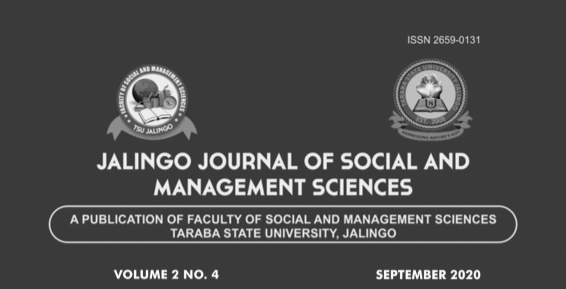Interrogating the Political Solution to the Tiv/Jukun Conflict in Taraba State: The Participatory Communication Approach
Keywords:
Indigene/settler dichotomy, Jukun/Tiv conflict, Political solution, Participatory communication, ReconciliationAbstract
The Tiv/Jukun conflict in Taraba which dates back to pre-independence period has been one of the most recurrent ethnic conflicts in Nigeria. The conflict has claimed lives and valuable property. There are so many factors responsible for the conflict such as fear of political domination and political control, indigene/settler dichotomy, land issue and population growth among others. The conflict has for long defiled traditional solutions to conflict management and the cycle of violence continued unabated with both the Tiv and the Jukun complaining of political and economic marginalization in Taraba and Benue. This paper interrogates the political solution to the conflict using participatory communication approach. It adopts development communication theory and uses descriptive and analytical research method as basis for analysis and discussion. The paper relied on secondary data and personal observation in its analysis and discussion. The paper discovered that the Tiv who are considered immigrants in Taraba by some of their Jukun neighbours continue to reject the ascription of a settler status on them and their agitation for inclusion in Taraba has been the major source of the conflict. The paper concludes that lack of political will in implementing resolutions reached on the conflict in the past has been part of the reasons why the conflict has refused to albeit. The paper also concludes that indigene-ship question, fear of political domination, lack of access to elected political offices, denial of indigene certificate and systematic marginalization has been identified as the reasons for the unending feud between the two groups in Taraba State and can only be addressed with the right political will. The paper then recommends that the government both at federal and state level should show the political will in addressing issues of marginalization claim by the Tiv by implementing previous resolutions reached in the conflict and that the government of the two states should change strategy from engaging with a select group of people (the elite) to engagement with the local people to harness their views on how to ensure peace in their area. It also recommends that the two states governments should set up joint peace and reconciliation commission to spearhead peace building process.

Downloads
Published
Issue
Section
License
Copyright (c) 2023 JALINGO JOURNAL OF SOCIAL AND MANAGEMENT SCIENCES

This work is licensed under a Creative Commons Attribution-NonCommercial 4.0 International License.
